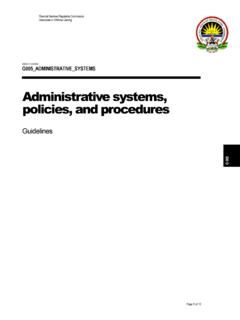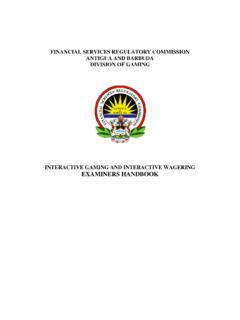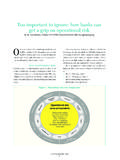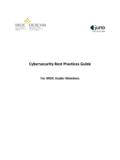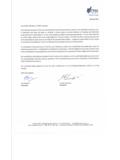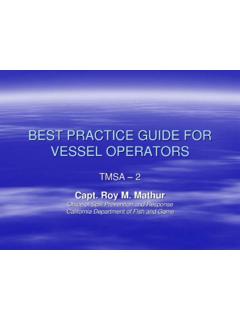Transcription of Financial Services Regulatory Commission Antigua …
1 Financial Services Regulatory Commission Antigua and Barbuda Division of Gaming Sound Practices for the Management of operational risk for Interactive Gaming & Interactive Wagering Companies November 2005 Guidelines for operational Risk Financial Services Regulatory Commission Division of Gaming Antigua and Barbuda November 2005 2 Sound Practices for the Management of operational risk for Interactive Gaming & Interactive Wagering Corporations Authority Section 316 (4) of the International Business Corporations Act (IBC Act) requires the Commission to take any necessary action required to ensure the integrity of the International Business Corporation sector. The International Business Corporations (Prudential Management of Licensed Corporations) Regulations, 2004 - Statutory Instrument No. 9 of 2004- prescribe that a licensed corporation: shall carry out its business in a prudent manner in accordance with the industry standards and best practices and any guidelines or directions issued by the Commission [regulation 4].
2 Establish and implement policies, practices and procedures relating to identification, measurement, monitoring and control of default risk, liquidity risk, legal risks and operational risks [regulation 8(1) (g)] and the Interactive Gaming and Interactive Wagering Regulations 87 to 94. shall be guided by such guidelines or directions as the Commission may issue in relation to policies, practices and procedures of a licensed corporation [regulation 6]. These guidelines are being issued for the guidance and compliance by the corporations licensed to carry on interactive gaming and interactive wagering business but shall be applicable to other licensed corporations also to the extent they are relevant. 2 Background operational risk is the risk of loss resulting from inadequate or failed internal processes, people and systems or from external events.
3 The definition includes legal risk but excludes strategic and reputational risk. operational risk is a distinct class of risk similar to default and market risk. Examples of operational risk include: Internal and external fraud Employment practices and workplace safety Clients, software, games and business practices Damage to physical assets Business disruption and system failures (telecommunications, gaming software and betting and wager errors) Execution, delivery and process management (for example, data entry errors, collateral, unapproved access given to player accounts, and vendor disputes.) operational risk differs from other IGIWC risks in that it is typically not directly taken in return for an expected reward, but exists in the natural course of corporate activity. At the same time, failure to properly manage operational risk can result in a misstatement of a company s risk profile and expose the company to significant losses.
4 Management of operational risk includes identification, assessment, monitoring and control/mitigation of risk. Guidelines for operational Risk Financial Services Regulatory Commission Division of Gaming Antigua and Barbuda November 2005 33 Developing an Appropriate Risk Management Environment The board of directors should be aware of the major aspects of the IGIWC operational risks as a distinct risk category that should be managed, and it should approve and periodically review the IGIWC operational risk management framework. The framework should provide a firm-wide definition of operational risk and lay down the principles of how operational risk is to be identified, assessed, monitored, and controlled/ mitigated. The board should provide senior management with clear guidance and direction regarding the principles underlying the framework and approve the corresponding policies developed by senior management.
5 The framework should cover the company s appetite and tolerance for operational risk, as specified through the policies for managing this risk and the IGIWC prioritization of operational risk management activities, including the extent of, and manner in which, operational risk is transferred outside the company. It should also include policies outlining the IGIWC approach to identifying, assessing, monitoring and controlling/mitigating the risk. The degree of formality and sophistication of the IGIWC operational risk management framework should be commensurate with the company s (private or publicly listed) risk profile. The board should establish a management structure capable of implementing the IGIWC operational risk management framework. It should establish clear lines of management responsibility, accountability and reporting. In addition, there should be separation of responsibilities and reporting lines between operational risk control functions, business lines and support functions in order to avoid conflicts of interest.
6 The board should review the framework regularly to ensure that the IGIWC is managing its operational risks and conforms to industry best practice. If necessary, the board should revise its operational risks so that all material operational risks are captured. 4 Internal Audit The board of directors should ensure that the IGIWC operational risk management framework is subject to effective and comprehensive internal audit by operationally independent, appropriately trained and competent staff. The internal audit function should not be directly responsible for operational risk management. The board (either directly or indirectly through its audit committee) should ensure that the scope and frequency of the audit program is appropriate to the risk exposures. Audit should periodically validate that the IGIWC s operational risk management framework is being implemented effectively across the IGIWC.
7 Where audit function at some IGIWC s (particularly smaller companies) has initial responsibility for developing an operational risk management program, IGIWC s should see that responsibility for day-to-day operational risk management is transferred elsewhere in a timely manner. Guidelines for operational Risk Financial Services Regulatory Commission Division of Gaming Antigua and Barbuda November 2005 45 Senior Management Senior management should have responsibility for implementing the operational risk management framework approved by the board of directors. The framework should be consistently implemented throughout the whole on-line gaming organization, and all levels of staff should understand their responsibilities with respect to operational risk management. Senior management should also have responsibility for developing policies, processes and procedures for managing operational risk in all of the on-line gaming company s material products, activities, processes and systems.
8 Senior management should clearly assign authority, responsibility and reporting relationships to encourage and maintain accountability, and ensure that the necessary resources are available to manage operational risk effectively. Senior management should assess the appropriateness of the management oversight process in light of the risks inherent in a business unit s policy. Senior management should ensure that on- line gaming company s activities are conducted by qualified staff with the necessary experience, technical capabilities and access to resources, that staff responsible for monitoring and enforcing compliance with the IGIWC risk policy have authority independent from the units they oversee and that the on-line gaming company s operational risk management policy has been clearly communicated to staff at all levels in units that incur material operational risks .
9 Senior management should ensure that staff responsible for managing operational risk communicates effectively with staff responsible for managing credit, market, and other risks , as well as with those in the company who are responsible for the procurement of external Services such as gaming software provider, alternate payment solutions and outsourcing agreements (customer service support and affiliates and associates). Senior management should also ensure that the on-line gaming company s remuneration policies are consistent with its appetite for risk. Remuneration policies which reward staff that deviate from policies ( by exceeding established limits) weaken the company s risk management processes. Particular attention should be given to the quality of documentation controls and to transaction-handling practices. Policies, processes and procedures related to advanced technologies supporting high transactions volumes, in particular, should be well documented and disseminated to all relevant personnel.
10 6 Identification, Assessment, Monitoring and Mitigation/Control of operational risk Identification On-line Gaming companies should identify and assess the operational risk inherent in all proprietary software and games, activities, processes and systems. Effective risk identification considers both internal factors (such as the on-line gaming company s structure, the nature of the company s activities, the quality of the company s human resources, organizational changes and employee turnover) and external factors (such as changes in the industry and technological advances) that could adversely affect the achievement of the gaming company s objectives. Assessment On-line Gaming company s should ensure that before new games, software activities, processes and systems are introduced or undertaken, the operational risk inherent in them is adequately assessed. Guidelines for operational Risk Financial Services Regulatory Commission Division of Gaming Antigua and Barbuda November 2005 5 Monitoring On-line Gaming company s should implement a process to regularly monitor operational risk profiles and material exposures to losses.
